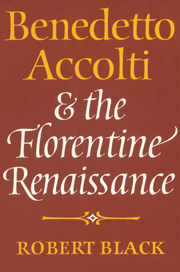Book contents
- Frontmatter
- Contents
- Dedication
- Preface
- Abbreviations
- 1 Arezzo in the early Renaissance
- 2 The Accolti family
- 3 Benedetto Accolti's early life and works
- 4 Accolti in Florence and Arezzo in the 1440s and early 1450s
- 5 Accolti's election as chancellor of Florence
- 6 The Florentine chancellorship
- 7 The Florentine chancery under Accolti
- 8 Accolti's Dialogus
- 9 Accolti's history of the first crusade and the Turkish menace
- 10 Accolti and Renaissance historiography
- Epilogue
- Appendix I Letters of Benedetto Accolti
- Appendix II Accolti's work as a palace official during his chancellorship
- Appendix III Pratica concerned with increasing Accolti's salary as chancellor
- Appendix IV Accolti and the incident of Ponzano, July–August 1463
- Select bibliography
- Index
- Frontmatter
- Contents
- Dedication
- Preface
- Abbreviations
- 1 Arezzo in the early Renaissance
- 2 The Accolti family
- 3 Benedetto Accolti's early life and works
- 4 Accolti in Florence and Arezzo in the 1440s and early 1450s
- 5 Accolti's election as chancellor of Florence
- 6 The Florentine chancellorship
- 7 The Florentine chancery under Accolti
- 8 Accolti's Dialogus
- 9 Accolti's history of the first crusade and the Turkish menace
- 10 Accolti and Renaissance historiography
- Epilogue
- Appendix I Letters of Benedetto Accolti
- Appendix II Accolti's work as a palace official during his chancellorship
- Appendix III Pratica concerned with increasing Accolti's salary as chancellor
- Appendix IV Accolti and the incident of Ponzano, July–August 1463
- Select bibliography
- Index
Summary
It was while Accolti was chancellor that he published his first extended Latin composition, a dialogue. It takes the form of two long speeches, one by an unidentified young man who attacks the merits of modern times in contrast to antiquity, the other by Accolti, who defends the moderns against the ancients. They examine ancient and modern warfare, morals, statesmanship, cities, poetry, rhetoric, philosophy, law and religion; although the young man offers a comprehensive defence of antiquity and condemnation of modern times, all his arguments are refuted by Accolti, who in an even more vigorous defence of moderns and censure of ancients, emerges victorious in the debate.
The origins of Accolti's dialogue can be traced to his cool relations with the Medici. Accolti dedicated the work to Cosimo, who also receives there an effusive panegyric; it has been observed that Accolti's is one of the most extravagant encomia among those written during Cosimo's lifetime, and one reason for the dedication, as well as the particularly sycophantic tone of this panegyric, was Accolti's desire to achieve an intimacy with the Medici which had so far eluded him. In the preface Accolti makes no secret of his intention to win the friendship of Gosimo, to whom, he declares, he has dedicated the work, ‘not because it is worthy of you but so that my love for you should become better known’. Accolti believed flattery would gain Cosimo's favour:
- Type
- Chapter
- Information
- Benedetto Accolti and the Florentine Renaissance , pp. 184 - 223Publisher: Cambridge University PressPrint publication year: 1985



